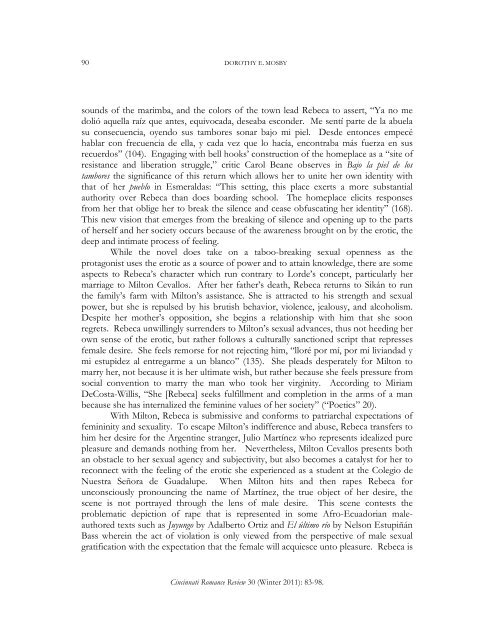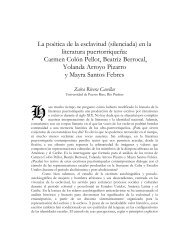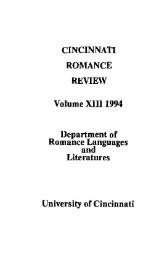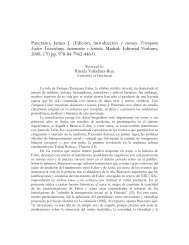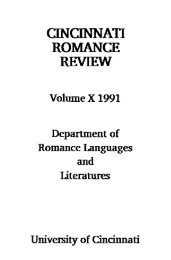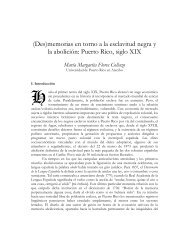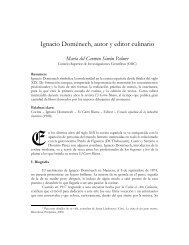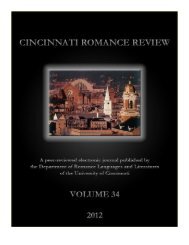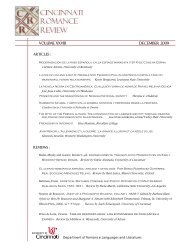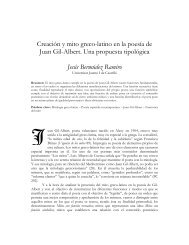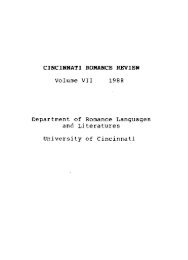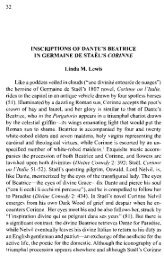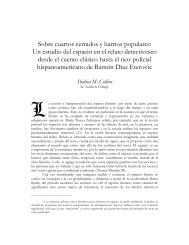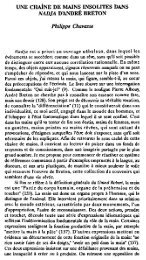Volume 30 (2011) - Cincinnati Romance Review
Volume 30 (2011) - Cincinnati Romance Review
Volume 30 (2011) - Cincinnati Romance Review
Create successful ePaper yourself
Turn your PDF publications into a flip-book with our unique Google optimized e-Paper software.
90 DOROTHY E. MOSBY<br />
sounds of the marimba, and the colors of the town lead Rebeca to assert, “Ya no me<br />
dolió aquella raíz que antes, equivocada, deseaba esconder. Me sentí parte de la abuela<br />
su consecuencia, oyendo sus tambores sonar bajo mi piel. Desde entonces empecé<br />
hablar con frecuencia de ella, y cada vez que lo hacía, encontraba más fuerza en sus<br />
recuerdos” (104). Engaging with bell hooks’ construction of the homeplace as a “site of<br />
resistance and liberation struggle,” critic Carol Beane observes in Bajo la piel de los<br />
tambores the significance of this return which allows her to unite her own identity with<br />
that of her pueblo in Esmeraldas: “This setting, this place exerts a more substantial<br />
authority over Rebeca than does boarding school. The homeplace elicits responses<br />
from her that oblige her to break the silence and cease obfuscating her identity” (168).<br />
This new vision that emerges from the breaking of silence and opening up to the parts<br />
of herself and her society occurs because of the awareness brought on by the erotic, the<br />
deep and intimate process of feeling.<br />
While the novel does take on a taboo-breaking sexual openness as the<br />
protagonist uses the erotic as a source of power and to attain knowledge, there are some<br />
aspects to Rebeca’s character which run contrary to Lorde’s concept, particularly her<br />
marriage to Milton Cevallos. After her father’s death, Rebeca returns to Sikán to run<br />
the family’s farm with Milton’s assistance. She is attracted to his strength and sexual<br />
power, but she is repulsed by his brutish behavior, violence, jealousy, and alcoholism.<br />
Despite her mother’s opposition, she begins a relationship with him that she soon<br />
regrets. Rebeca unwillingly surrenders to Milton’s sexual advances, thus not heeding her<br />
own sense of the erotic, but rather follows a culturally sanctioned script that represses<br />
female desire. She feels remorse for not rejecting him, “lloré por mí, por mi liviandad y<br />
mi estupidez al entregarme a un blanco” (135). She pleads desperately for Milton to<br />
marry her, not because it is her ultimate wish, but rather because she feels pressure from<br />
social convention to marry the man who took her virginity. According to Miriam<br />
DeCosta-Willis, “She [Rebeca] seeks fulfillment and completion in the arms of a man<br />
because she has internalized the feminine values of her society” (“Poetics” 20).<br />
With Milton, Rebeca is submissive and conforms to patriarchal expectations of<br />
femininity and sexuality. To escape Milton’s indifference and abuse, Rebeca transfers to<br />
him her desire for the Argentine stranger, Julio Martínez who represents idealized pure<br />
pleasure and demands nothing from her. Nevertheless, Milton Cevallos presents both<br />
an obstacle to her sexual agency and subjectivity, but also becomes a catalyst for her to<br />
reconnect with the feeling of the erotic she experienced as a student at the Colegio de<br />
Nuestra Señora de Guadalupe. When Milton hits and then rapes Rebeca for<br />
unconsciously pronouncing the name of Martínez, the true object of her desire, the<br />
scene is not portrayed through the lens of male desire. This scene contests the<br />
problematic depiction of rape that is represented in some Afro-Ecuadorian maleauthored<br />
texts such as Juyungo by Adalberto Ortiz and El último río by Nelson Estupiñán<br />
Bass wherein the act of violation is only viewed from the perspective of male sexual<br />
gratification with the expectation that the female will acquiesce unto pleasure. Rebeca is<br />
<strong>Cincinnati</strong> <strong>Romance</strong> <strong>Review</strong> <strong>30</strong> (Winter <strong>2011</strong>): 83-98.


